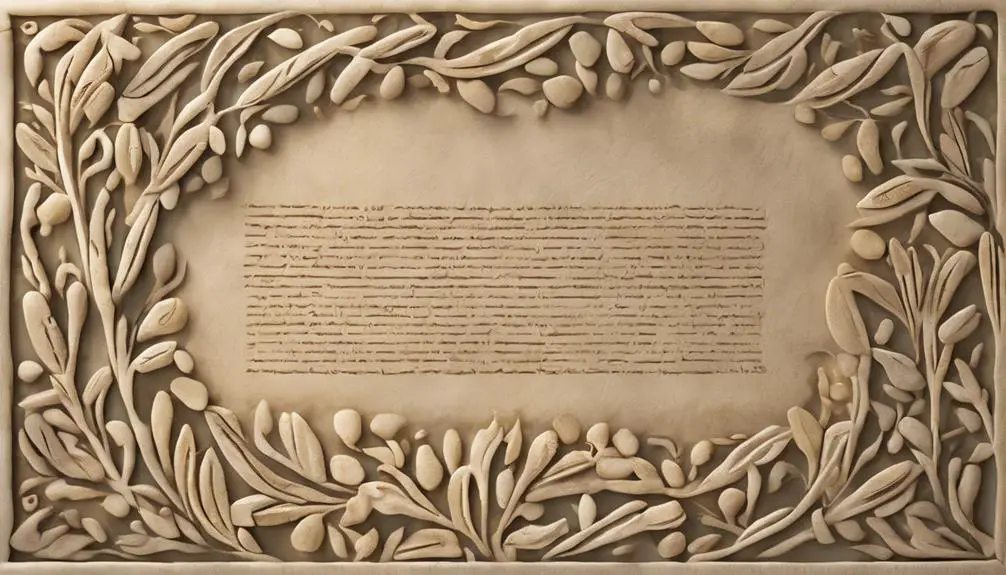Biblical names starting with 'I' reveal deep stories and meanings, enticing readers to uncover the mysteries and significance behind each one.

Names in the Bible That Start With I
When you journey through the labyrinth of the Bible, you'll find that names starting with 'I' carry a weight of significance and mystery.
From Isaac, symbolizing laughter and a promise, to Isaiah, representing a vision of salvation, these names are not just markers of identity but are imbued with profound meanings and stories.
You'll also encounter Ishmael, whispering the comforting message that 'God hears', Ithamar, showcasing the beauty of the 'Palm Coast', and Izri, reminding us of our creation.
Each name opens a door to a narrative that has shaped beliefs and cultures, beckoning you to explore the depths of their origins and implications. Let's just say, there's more to these names than meets the eye.
Key Takeaways
- Names beginning with 'I' in the Bible often hold deep meanings, such as Isaac ('laughter') and Ishmael ('God hears').
- These names embody significant themes, including joy, spiritual resilience, and the fulfillment of divine promises.
- Individuals with 'I' names play crucial roles in biblical narratives, from Isaac's life of faith to Isaiah's prophetic visions.
- The symbolism attached to these names enhances their narratives, reflecting broader spiritual lessons and connections to faith and covenant.
Isaac: Laughter and Promise

Isaac's name, meaning 'laughter,' symbolizes the joy and the fulfillment of God's promise to Abraham and Sarah, despite their advanced age and initial disbelief. This naming not only captures a moment of divine humor and grace but also sets the stage for Isaac's pivotal role in the ancestral legacy of the Abrahamic religions. You'll find that Isaac's life is a narrative rich in themes of faith, sacrifice, and covenant, underscored by the binding narrative—a story that profoundly impacts the theological foundations and ethical considerations within these faith traditions.
Delving deeper, the binding narrative, where Abraham is commanded to sacrifice Isaac, isn't just a test of faith; it's a complex layering of obedience, trust, and divine intervention, illustrating a critical moment in the establishment of Isaac's role in his family's lineage and, by extension, his contribution to the ancestral legacy. This story emphasizes the interplay between divine will and human agency, showcasing how individual actions can align with, or challenge, perceived divine commands.
Isaac's existence and the narratives surrounding him are essential in understanding the broader theological and ethical frameworks that underpin the Abrahamic faiths. His life serves as a bridge between promise and fulfillment, illustrating how faith, tested through trials, contributes to the shaping of a people's identity and destiny.
Isaiah: Vision of Salvation

Building on the narrative of faith and divine promise exemplified by Isaac, the figure of Isaiah introduces a profound vision of salvation that reshapes our understanding of divine-human interaction and the unfolding of history. Isaiah's contributions are deeply rooted in prophetic imagery and Messianic predictions, marking a significant shift in the biblical narrative towards a more complex, hopeful vision of redemption.
You'll find that Isaiah's prophecies are rich with symbols and metaphors, each meticulously crafted to convey a multi-layered message of hope and salvation. His visions extend beyond the immediate political and social circumstances of his time, reaching into the future to predict the coming of a Messiah who'd bring ultimate salvation to humanity. This Messianic expectation is a cornerstone of Isaiah's theological influence, offering a glimpse into a future where divine justice and peace prevail.
Isaiah's narrative isn't just about foretelling events; it's a call to faith and repentance, urging you to see beyond the present turmoil and embrace a vision of salvation that's both imminent and transcendent. Through his prophetic imagery and Messianic predictions, Isaiah challenges you to reimagine your relationship with the divine, emphasizing that salvation isn't only possible but promised, heralding a new era of divine fulfillment and human flourishing.
Ishmael: God Hears

Transitioning from the visionary prophecies of Isaiah, we now encounter Ishmael, whose name—meaning 'God hears'—unveils a complex narrative of divine attentiveness and human struggle. At the heart of Ishmael's story is the intertwining of despair and hope, emblematic of his survival in the desert, which symbolizes not only physical but also spiritual resilience. Ishmael's lineage, as a precursor to numerous nations, signifies an enduring legacy shaped by divine intervention and human endeavor.
Delving deeper into the narrative, you find that Ishmael's desert survival isn't merely a tale of endurance but a testament to the provision and foresight of the divine. This survival underscores the broader theme of sustenance in desolation, mirroring the spiritual wilderness that individuals navigate. The profound implications of Ishmael's name and his life's journey reveal a nuanced understanding of God's relationship with humanity, illustrating that divine hearing isn't passive but actively involves salvation and sustenance.
Analyzing Ishmael's lineage further, it's evident that his descendants' significant role in history isn't incidental. Their emergence from desert survival to become a great nation underscores a narrative of divine promise and human perseverance, offering a rich tapestry for theological reflection.
Ithamar: Palm Coast

Ithamar's story, signifying 'Palm Coast,' introduces us to a narrative deeply rooted in the themes of growth and resilience amidst adversity. As the youngest son of Aaron, the first High Priest, Ithamar's lineage places him in a position of significant religious responsibility within the Israelite community. His role in the construction and service of the Tabernacle, especially concerning the Priestly garments, highlights his contributions to the spirituality and culture of his people.
In analyzing Ithamar's impact, consider these key factors:
- Ithamar's lineage ties him directly to the foundational figures of the Israelite priesthood, emphasizing the continuity and legacy of religious leadership.
- The Priestly garments, with their intricate designs and symbolic meanings, were under Ithamar's oversight, reflecting the importance of ritual and ceremony in connecting the community with the divine.
- Ithamar's management of the Tabernacle's construction demonstrates his logistical capabilities and dedication to creating a sacred space for worship.
- His ability to oversee the Levites in their duties illustrates his leadership qualities and his role in maintaining the spiritual and operational integrity of the priesthood.
Ithamar's narrative, therefore, isn't just one of lineage and responsibility but also a testament to the enduring power of faith and community.
Izri: My Creator

Shifting our focus to Izri, whose name signifies 'My Creator,' we encounter another profound narrative embedded within the tapestry of biblical names and their meanings. Izri's lineage, intricately woven into the fabric of biblical genealogies, offers a unique lens through which to explore the multifaceted roles individuals assumed within the scriptural context. As a descendant of Levi, Izri's heritage is emblematic of a lineage dedicated to religious service and the spiritual leadership of the Israelites. This dedication underscores the significance of Izri's contribution to the spiritual and cultural milieu of his time.
Delving deeper into Izri's biblical roles, we uncover his specific designation as a musician in King David's court. This position, while seemingly modest, was of paramount importance in the ritualistic and ceremonial practices of the time. Izri, along with his fellow Levites, was tasked with the creation of a sacred musical atmosphere conducive to worship and reflection. This role not only highlights the centrality of music in religious expression but also positions Izri as a direct contributor to the cultural legacy of the Israelite community. Through his dedication to his craft, Izri exemplified the profound connection between artistic expression and divine worship, thereby reiterating the intrinsic value of creativity in fostering spiritual growth and communal solidarity.
Frequently Asked Questions
How Do the Meanings of Names Starting With 'I' in the Bible Reflect the Cultural and Religious Context of Their Time?
You're exploring how names reflect their era's cultural and religious ethos.
For instance, Ishmael's lineage symbolizes God's provision and wilderness survival, underscoring themes of divine intervention and resilience.
Meanwhile, Isaac's sacrifice, a pivotal narrative, illustrates themes of faith and obedience.
These names, rooted in profound biblical events, offer a lens into the values and beliefs shaping their time, revealing a complex interplay between identity, divinity, and cultural narratives.
Are There Any Significant Variations in the Spellings of Names Starting With 'I' Across Different Translations of the Bible, and What Do These Variations Signify?
Yes, you'll find significant spelling variations for names in different Bible translations. These differences highlight the complexities of translation methodologies and comparative linguistics. They're not just random; they reflect deep scholarly debates about ancient texts' interpretation.
Analyzing these variations can reveal how translators balance linguistic fidelity with the text's spiritual essence. It's a fascinating glimpse into the challenges of faithfully conveying sacred texts across languages and cultures.
How Do the Stories of Individuals With Names Starting With 'I' in the Bible Influence Contemporary Naming Practices Among Various Cultural and Religious Groups?
You're diving into how stories shape naming trends analysis, focusing on cultural identity expression. By examining the influence of these narratives, you'll see a direct link between ancient characters and modern naming practices.
These names carry weight, symbolizing virtues, hopes, or spiritual connections. Your exploration reveals a rich tapestry of cultural and religious groups adopting these names, embedding deep historical and spiritual significance into their identity expression through this choice.
Can the Influence of Names Beginning With 'I' From the Bible Be Seen in Literature and Popular Culture Outside of Religious Contexts?
You'll find that Isaac's influence and Ishmael's legacy extend beyond religious texts into literature and popular culture. Their stories resonate in various narratives, shaping characters and themes in unexpected ways.
This presence underscores the profound impact biblical figures can have, even outside their original contexts. By weaving these names into stories and media, creators tap into a rich tapestry of symbolism and meaning, illustrating the timeless relevance of these ancient figures.
How Do Biblical Scholars Interpret the Symbolic Significance of the Letter 'I' in the Context of Biblical Names, and How Does This Compare to the Symbolism of Other Letters in Biblical Nomenclature?
You're delving into how experts dissect the meaning behind the letter 'i' in names, comparing it to other initials. They often see 'i' as a beacon of illumination and interpretation, suggesting wisdom or enlightenment. This contrasts with other letters, each carrying unique symbolic weight.
Your journey seeks to uncover if 'i' serves as initial inspiration in a broader spectrum, highlighting its distinct influence amidst a tapestry of alphabetical symbolism in biblical nomenclature.
Conclusion
In conclusion, the names Isaac, Isaiah, Ishmael, Ithamar, and Izri, originating from the Bible and starting with the letter 'I,' encapsulate deep theological and moral meanings. They reflect a spectrum of divine interactions, from laughter and promise to vision and creation, each embedding a unique narrative within the biblical context.
Analyzing these names reveals not only their historical significance but also their enduring impact on cultural and religious identities, highlighting the intricate relationship between nomenclature and theological discourse.



Sign up